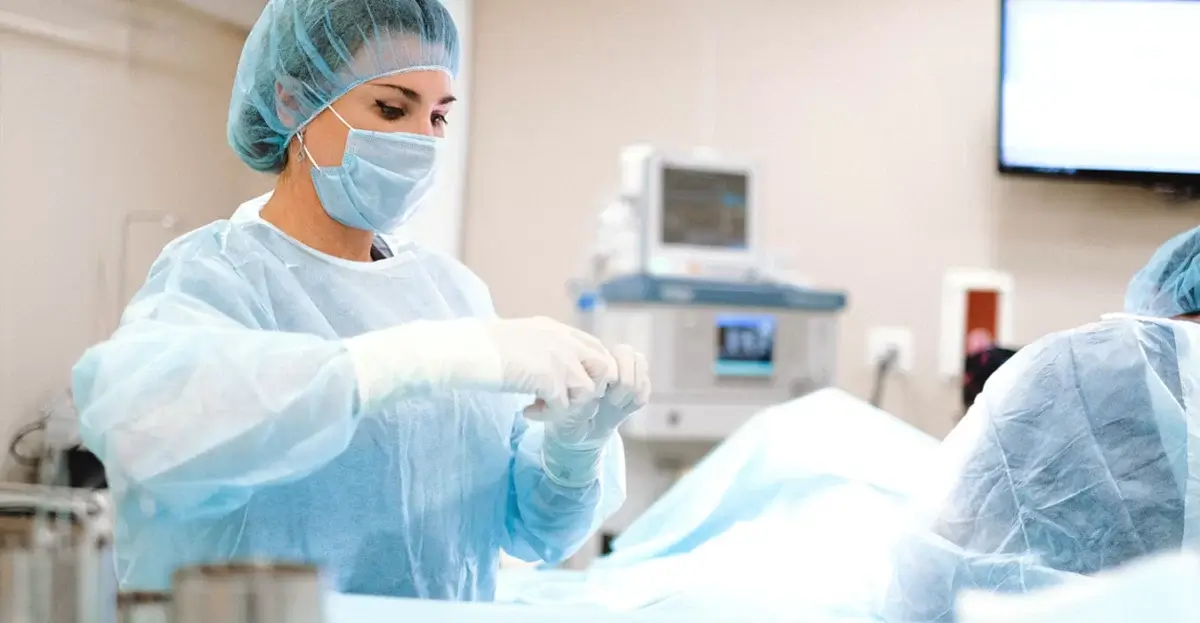OR nurses are the masters of the balancing act.
Perioperative Nurse Week is celebrated every year in the second week of November, from November 13 to 19 this year. It is an important week celebrating the achievements and contributions of perioperative nurses to the medical field. To speak more generally, a perioperative nurse is a registered nurse (RN) who works in the operating room (OR). While many OR nursing skills are taught in a classroom, other OR nursing skills can only be developed with exposure and experience. Being an OR nurse takes an incredible amount of varied skills and training, as it’s a critical, high-stress environment. These nursing professionals are in charge of so many things, even before a patient enters the room. In spirit of these year’s Perioperative Nurse Week, let’s dive into what makes these nurses extra special.
What do Perioperative/OR nurses do?
OR nurses have many duties and critical ones that don’t even involve direct patient care. For starters, these healthcare professionals ensure the operating room is clean and along with the supplies. Once cleanliness is confirmed they are the ones working with the tech to count and open all supplies and instruments to prep overall equipment. Then OR nurses will meet with patients and do a preliminary interview. Then there is the operation support. And lastly, timely turn-overs (the time between one patient leaving the OR to the time that another patient enters it).
OR nurses are the masters of the balancing act.
What are the qualities of a successful OR nurse?
All skilled, trained professional registered nurses come jammed packed with a test of tried and true skillsets. If you are considering taking a travel contract or permanent contract in the operating room, the below are the top skills we see in demand for OR nurses in 2022 — and beyond.
-
Top-notch Communication Skills
Yes, this can be said for all roles and all gigs. But here at SkillGigs, we see OR nurses as being the #1 patient advocate above all other duties. And that is no small responsibility. From the moment the OR nurses meets and interviews a patient, they take on the responsibility to keep their best interests in play while the patient lay unconscious. Therefore, these nurses have to mitigate and switch communication styles between patient, to staff members, and to doctors. All this, while being very conscientious of that fact that tensions run high in the operating room. A big part of communication is also the ability to manage non-verbal communication. If an OR nurses goes whipping in and out of a patients room pre-op, it will certainly calm no nerves. Their ability to quickly self-check, calm, and pivot is simply amazing.
-
Strong Ego
Say what? You read that right: ego. Now this is by no means a substitute. On the contrary, what we really mean is the ability to confront; hold strong; and keep your composure. There was another post we read from a retired OR nurse, and she said, “If you cannot confront others, you will not become an operating room nurse.” Every day is a new set of conflict resolution that is required to maintain the course, the schedule, and above the rest, patient care. Similar to what was stated in needing good communication across staff and doctors (also throw in unlicensed professionals), there will be confrontation issues throughout each shift. Remember when we said tensions run high? Picture this, you are the OR nurse at the start of an operation. You are running from task to task, item to item, and at one split moment when the surgeons calls for X, and you are not quick to respond — you personally will be called out for this. It’s not personal but it will feel as such. If this isn’t addressed (at a non-operation time) directly with the surgeon, it could create a toxic work environment for you as your ego can get smashed. What we have heard 9 times out of 10 (not a real stat), if you calmly address this with the surgeon they will apologize and admit they do not even recall the comment(s). The OR is a place for those with the right, healthy-amount of ego. And it’s also a great place to hone this skill.
-
Organizational Skills
The word “organization” has taken on a whole new meaning for many during COVID. From saying ‘thank you’ to inanimate objects and moving on to recognizing there are better ways to managing things for efficiency. Therefore, this skill can be acquired if, trained, honed — so no worries if you feel that you cannot check the box right now. With that said, OR nurses are responsible for organizing supplies, actions, and charting to allow the best outcome for the patient in surgery. In an operation, time is everything. An OR nurses must be able to find supplies, medications, and tools within in SECONDS, not minutes. Surgeons may be the top soloist, but OR nurses are the conductors of the operating room. It is yours to manage, prep, and organize.
-
Critical Thinking Skills/Adaptability
We are combining two here, but bare with us. During any operation, the most basic of procedures have a percentage chance of changing into nightmares. Are you ready? Can you respond appropriately in a matter of seconds? Are the decisions are making in the moment going to help or hinder the situation? If something changes abruptly, so does the OR nurse’s entire routine. And this ability to switch routines, at times, comes from the pre-op interview with the patient. Understanding their allergies, lifestyle, past procedures, are all critical to adapt in the moment if something turns.
-
Mental & Physical Stamina
Physical stamina is a useful quality for an OR nurse. Many nursing tasks require the nurse to bend, stoop, crouch, or stand in uncomfortable positions for a long time. OR nurses must also spend much of their working day on their feet going from patient to patient as well as operation to operation, or, at times, they must move heavy equipment. An OR nurse who is in a good physical condition is less likely to suffer a work-related injury or to become exhausted by the end of the shift. But stamina is not just physical, but also mental — and sometimes, even more critical. Unexpected long shifts, varied case loads, and adjusting to new operating staff (shifting your communication and amping your EGO), are all just some of the ways you can be drained mentally. This job will require some level of personal dedication and motivation to get through the times where mentally, you are exhausted.
Bonus: What are the top most common OR resume standouts?
Do you possess these core top skills, and then some? Consider adding the following into your SkillGigs skill listing and 3D Resume:
- Up-to-Date BLS:
- Audit charts, Staff nurse, ACLS, PALS and BLS certified.
- Charge Nurse ACLS, BLS, and PALS certified.
- Charge Nurse Laser Safety officer ACLS, BLS, and PALS certified.
- Monitor need for staff competencies (ie, glucometer, BLS, ACLS, TB, etc).
- Any participation in professional development program by obtaining oncology certification and BLS instructor certification.
- Detailed explanation of patient care, of before, during, and after procedures
- Details on the specific types of surgical procedures
How do you become an OR nurse?
The first step is simple: you must become a registered nurse (RN) by obtaining either an Associate’s Degree in Nursing (ADN) or a Bachelor of Science in Nursing (BSN). Both roads lead to an RN career, but you’ll have to decide whether an ADN or a BSN is best for your own career aspirations. Once you have your nursing degree in hand, you’ll have to pass the National Council Licensure Examination (NCLEX-RN) before working as a registered nurse.
After becoming a fully licensed RN, you can begin working toward a specialty in operating room nursing. Gaining experience in medical situations will be key. Try working as a float nurse in your hospital’s OR room or assisting teams of paramedics to acquire applicable experience.
Curious about SkillGigs? CLICK HERE!
Interested in Travel Healthcare? CLICK HERE!





